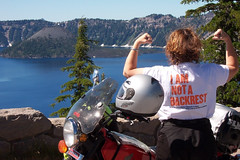
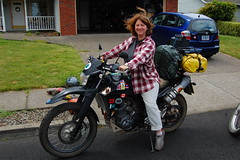
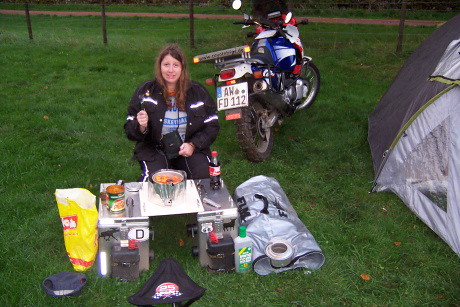

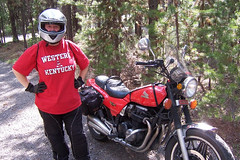
CoyoteBroad's Advice for Women Motorcycle Travelers:
Accommodation Choices





Some people love to camp, others find camping a form of torture and hate having to hall all that gear on their bikes. Some people love the personal, "homey" nature of a bed & breakfast, and others much prefer the anonymity and predictability that staying in a chain or luxury hotel brings. Some people want to be on the lookout for ways to save money, others want travel to be their opportunity to splurge. Some people want to do everything on their own, and others want everything planned out and arranged for them by a professional travel agent long before they start their trip.
You have to find out which is right for you. If you like it, then it's the right way of traveling.
Most likely, you will find yourself wanting to combine different traveling styles, and that different styles fit different countries or regions. I once took a motorcycle trip where I stayed in a youth hostel one night, a luxury cabin with a bathroom, kitchen and cable TV another night, a rented room in a woman's home another night, and a cabin with nothing but two beds and a hot plate another night. And it was a GREAT trip!
Do what is right for YOU. Don't let anyone bully you into traveling a way you don't want to, or make you feel self-conscious about your preferences. I have friends who balk at the way I travel, and I've balked at some of their preferences. But, in the end, we did what was right for each of us, and had the trip each of us wanted.
And do take steps to stay safe. I don't really talk about personal safety below - just motorcycle safety.
Accommodation options (and my thoughts on each):
Camping
It's my favorite accommodation while motorcycling. I absolutely love it.
I meet interesting people who are also traveling, get travel advice for
the road I'm about to take (because someone has usually come from
there), my bike is right there a few meters from me, and there is
usually some lovely scenery - a lake, a mountain, the ocean, a huge
field, whatever - nearby. It's affordable, and I really feel
like I'm traveling. Most other campers are much better behaved than
people in motels - they need to sleep, just like you. And because I'm on
a motorcycle, other campers have felt the need to give me free coffee,
food, and firewood.
In the USA and Canada, there's no need to take stools/chairs - all camp sites come with picnic tables. In Europe, that's not at all the case.
In the USA and Canada, you may not be anywhere near a store or restaurant at all while camping. In England and Scotland, campsites are very often near a small village (that means easy access to grocery stores and PUBS!).
In the USA and Canada, there's usually no place provided for tent campers to cook if the weather turns bad. By contrast, most camp sites in Europe do provide such.
Some camp sites have no running, drinkable water at all. Some have water spigots or pumps but only pit toilets. And some - especially state parks - have bathrooms with showers. I'm very partial to state parks in the USA - you may find one with rock climbing (South Dakota), a dirt track (Missouri), a planetariam and dune sledding (Idaho), or a museum of Audubon paintings and prints (Kentucky).
My packing list is based on camping while motorcycling.
For choosing your tent: get a two-person tent if you will usually be camping alone, and a three-person tent if you will be camping with another person; the extra space is for your gear, and room to easily move about - something you will want for dressing, or on a rainy day when you might be in your tent for an extended period. Get a tent with a vestibule (good for leaving shoes and, perhaps, your cooler, if you aren't in bear country, outside), and with ventilation in the back of the tent (some days and nights, you will need it!). A separate rain fly is essential, one that extends well over the door. Tents that have floors made from one piece of material are less likely to let water seep in than those with seams. Having a tarp on the ground under your tent will better ensure no water gets in (water in your tent is AWFUL, trust me).
You want a warm sleeping bag (bring a light sheet if it will be too warm to close up the sleeping bag, and use this to cover you when you sleep instead of the bag), and a air mattress (many camping mattresses will self-inflate at least 50% in about 45 minutes). I bring an air pillow as well.
All this packs down surprisingly small!
Cabins and Rented Trailers
In the USA, you can sometimes find cabins at state parks and private
camp grounds - but in high season, these are booked months in advance
for the weekends. Some come with bathrooms, some don't. Some come with
kitchens, some don't. If you are a tent camper, then sleeping in a
cabin, even without a bathroom, will feel like a luxury - and sometimes,
it's what you need after several nights of sleeping on the ground, even
with an air mattress. I particularly like it when the weather turns
ugly, since American camp sites don't come with a covered place for
people to cook (do NOT cook inside your cabin - cook on the porch).
Hostels
Usually called "youth" hostels, these can provide a great way to travel on
the cheap and to meet other travelers. They are few
and far between in the USA, but abundant
in Western Europe. The downside of them is that they may not provide
secure parking for a motorcycle, and they may be loud at night.
I'm not a big fan of youth hostels -- I prefer bed and breakfasts or rented rooms when traveling abroad, if I can't camp. If a youth hostel is truly youth-focused, then it will be way too loud at night to be able to sleep (something I do enjoy doing after a long day of site-seeing or motorcycle riding), and in addition, I have little interest in talking with the others if they are traveling only to party and get laid. That said, some hostels are fantastic -- particularly in Scotland and Scandinavia, where hostels cater much more to walkers and adult travelers, rather than just youth, and staying in them gives you access to not only cheap, comfortable accommodations, but really cool fellow travelers.
Many hostels offer private rooms for couples or even for single travelers. Some even have bathrooms in your room, rather than down the hall. If you are traveling in a group of three or more, it will be easy and cheap for you to reserve an entire group dormitory just for yourselves (provided such is available).
Some tips for staying in a hostel:
Independent and Budget Hotels and Motels
I use locally-owned motels when I really need a private bathroom
for some reason (illness, or just sick of state park showers), or the
weather is just beyond awful and I can't face putting up a tent in the
pouring rain. I want my motorcycle parked right outside my door, where I
can see it as soon as I open my door. I will not stay anywhere
that does not have adequate safety, no matter what the price. And I follow
my own advice about safety while traveling
when staying in such.
In the USA, and independent hotel does not necessarily mean it's also cheap, but it does often mean you can get a great local experience. For instance, both the Austin Motel and the San Jose Hotel, both in Austin, Texas, are legendary for both their locations (just down the street from each other, in the heart of the South Austin music and food scene), their atmosphere and their attitudes. I think I got a job once because I recommended the San Jose Motel to the company's representative.
Here's an example of what I mean by a great independent hotel while on the road: the Lost River Motel in Arco, Idaho. We had fought incredible winds all day, it was starting to rain, and Stefan, who is never, ever cold, was chilled to the bone. It turned out to be a great choice - very comfortable, affordable rooms, and a very friendly, bike-friendly owner. And our bikes were right out the door, just a few meters from the bed.
In the USA, I'm frightened of what we call budget hotels and motels, but abroad, budget hotels (pensions) are usually family-run, and provide a friendliness and warmth, plus a closeness to the local culture, that I want while traveling. Also, budget hotels abroad usually include breakfast. But, as noted in the following description as well, breakfasts can vary widely: some will be generous and some will be just bread and coffee. Look for budget hotels abroad that have excellent access to local attractions, or to transportation for such, in case you don't want to take a motorcycle.
What's just as important: motorcycle safety. Can you park your bike inside a garage, or even inside your room? Some motels and hotels in developing countries allow motorcycle travelers to park their motorcycles inside the lobby or dining room. Always ask where you could safely park your motorcycle. If your bike has to be outside, lock your bike to something!
Bed & Breakfasts (B & Bs), Pensions, "Zimmer Frei"
In the USA, B & Bs are oh-so-refined, to the point of making me
uncomfortable, and they are also very expensive. But abroad, bed and
breakfasts, also known as pensions or by the German sign for a room for
rent ("Zimmer Frei"), provide the friendliness, warmth, attention and
closeness to the local culture that I want while traveling -- and often at
a great price. You probably won't get a TV or phone at European B & Bs
(although I always did in Eastern
Europe!), but who needs them when you are just using your room to
sleep after traveling all day? B & Bs also often provide much better
parking security if you are traveling by bicycle or motorcycle,
since they will often allow you to park in the family garage, or in a
fenced, locked area of the property. Breakfasts can vary widely, however
-- some will be generous and some will be just bread and coffee. Look for
B & Bs abroad that have excellent access to local attractions, or to
transportation for such.
Chain hotels or chain motels
I use them while traveling by motorcycle only if I can't find a
locally-owned motel. I have to admit that I really hate chain
motels... for some reason, I feel like it's where my motorcycle is going
to get stolen.
Luxury Hotels
Unless someone else is paying, I don't stay in these, because I can't
afford them, and because I don't see what all the extra funds I'm paying
go for, in terms of my actual comfort. And in other countries, you will
feel very, very far from the locals if you stay in these. But maybe snazzy
carpeting and uniformed staff and valet parking and in-hotel restaurants,
bars and other activities so that you rarely have to leave the building
are what you expect when you travel -- if so, go for it. But remember: a
luxury hotel is often no more safe than anywhere else - even if they have
a parking garage for your motorcycle. Always take
steps to stay safe.
Remember that, with the Internet, it's now oh-so-easy to find out what kind of reputation any hotel, hostel, bed & breakfast or campground has among travelers! Always research before you book. I use:
If you have NEVER traveled outside the USA, then I would suggest your staying in a chain hotel, budget hotel or bed & breakfast on your first trip -- at least for the first two or three days. Then experiment for the rest of the trip. Don't give up on something because of a first-time bad experience.
And remember: if you don't feel safe, go somewhere where you will. If that means spending more money, then spend more money. Never compromise on your safety.
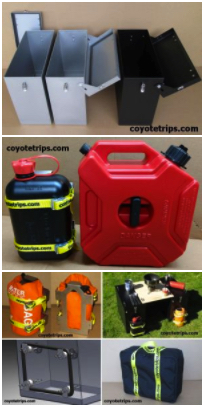

Adventure Motorcycle Luggage &
Accessories
www.coyotetrips.com
Aluminum Panniers and Top Cases,
Top Case Adapter Plates,
Tough Motorcycle Fuel Containers, & More
Designed or Curated by an experienced adventure motorcycle world
traveler
Based in Oregon
You won't find these exact products anywhere else;
these are available only from Coyotetrips
(my husband)
coyotebroad's motorcycle resources | return to coyotebroad abroad home page | contact me
if the information is kept intact and is credited to Jayne
Cravens.
Please contact me for permission to
reprint, present or distribute these materials.